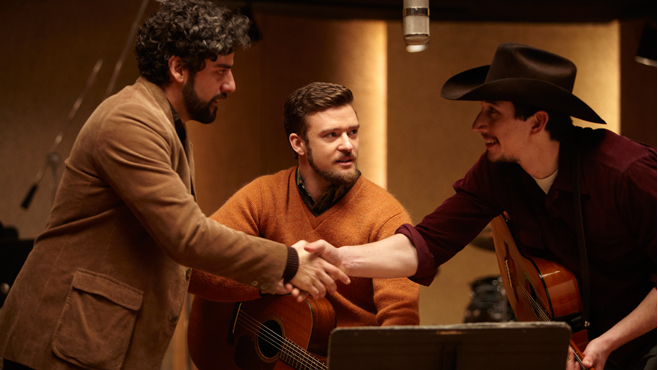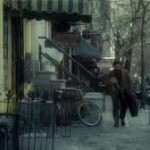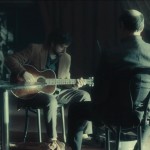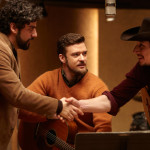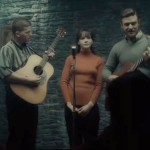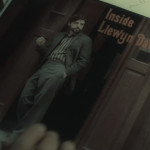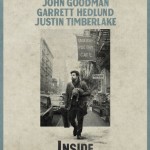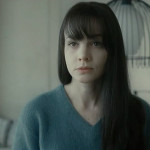Inside Llewyn Davis is the eponymous and non-selling debut LP by the principle protagonist of this movie. It is also the Coen brothers‘ take on the early 60s New York folk scene, then as dangerous and radical as punk was to the established order in the late 70s. It follows the fortunes of Davis, a folk-singing drifter with a Welsh name (courtesy of his mother) who sleeps on any sofa he can find, inadvertently accompanied by a ginger tabby cat owned by one of his hosts (whom later he insults but is forgiven.)
Davis bears more than a passing resemblance to a bearded version of Bob Dylan, literally and metaphorically (including the shots highly reminiscent of certain Dylan album covers), but at the end it is Dylan who appears on stage at the Gaslight Cafe to wow the crowds, where Davis gets beaten up for heckling a middle-aged musician. He is a loser, destined for a life of failure before moving on, being promoted beyond his level of competence in a company somewhere and settling down into middle class American obscurity with memories of what might have been. I guess there are very many who never quite made it, of whom Davis is but one, though it is humdrum reality that defeats him; tragic hero he is not.
The direct influence for this witty script is said to be Dave van Ronk‘s autobiography, though in truth it could be any one of a thousand hopefuls from the same period; and for this fictional yarn it doesn’t really matter anyway – even allowing for the very obvious nods towards Peter, Paul and Mary, among many others. For that reason, I have classified this movie as drama rather than biopic.
It is a tale of its time, capturing the mood of 1961, the cultural disconnect between the Village and the rest of New York, quite apart from the rest of America. This is a miserable New York at the height of the Cold War, awash with fear and cynicism, severely lacking confidence. You can tell the bleakness of the movie from the washed-out colours in which it is shot, not unlike the rain-swept city pictured in Se7en.
The folk movement was a bastion of hope, innocence and occasionally radical fever, inspecting the American navel with contempt, contrary to cultural tradition of the American dream, though Davis’s songs are gentle tales of relationships ending, sung sorrowfully but with charm by Oscar Isaac as Davis. The movie is arguably worth seeing for the songs alone. You get the impression that in parallel world he could sing the blues rather than sweet and wistful folk songs, redolent of what might have been rather than changing the world; Davis’s ambitions and aspirations don’t amount to a hill of beans.
The soulful atmosphere is reflected in the levels of hostility and obstruction with which Davis is met at every turn as he tries to get on in the shadow world of folk culture and simply to get by. These include his abusive ex-girlfriend Jean (the delectable and talented Carey Mulligan, also in The Great Gatsby) who is apparently pregnant, possibly by Davis, but for whom he arranges an abortion; his sister Joy, indicating a turbulent family history; and two bizarre musicians, with whom he cadges a lift to Chicago, played respectively by Garrett Hedlund (laconic) and the wonderful John Goodman (disagreeable), though nothing Davis does seems to turn out right.
But what is there by plot, I hear you ask. Quoted from Wikipedia:
Joel Coen remarked that “the film doesn’t really have a plot. That concerned us at one point; that’s why we threw the cat in.”
That need not be a problem, since this is primarily drama about the personalities, what they need from life and how they bounce off one another; and also perhaps a bleak, sad, gritty and slightly ironic black comedy, a genre in which the Coens have become masters. The atmosphere is heavy as we follow Davis around New York, to Chicago and back, trying to re-enter the Merchant Navy but failing through lack of funds, and ultimately back to the only game he knows: singing at the Gaslight. It’s worth saying that this is not a movie that will agree with every viewer, being by nature relentlessly and effervescently downbeat but often funny – not belly laugh funny but ironic chuckle funny, such as when Davis looks at a toilet cubicle wall to find someone has carved “what do you want?” He stares back at it and blinks. Says it all.
Look deeper and you will see many flashes of light and shade, often through music but also the craft of the Coens. The camera angles, the crisp editing, the playing, the script, the subtle twists. Directors Joel and Ethan have chosen to play the parts of silent observers, seeing everything but choosing not to comment or participate in the action. In so doing they say more than mere movie footage and motifs like the cat (arguably the best actor on display) or the guitar and stage can articulate. Perhaps their note is one of mournful affection deep within the subtext of the movie.
So maybe the question I should pose is whether Inside Llewyn Davis deserves its many plaudits and the 94% rating on Rotten Tomatoes and reviews such as this one by Peter Bradshaw in the Guardian. Well, worth mentioning that the esteemed Mark Kermode thinks this is a movie to be admired rather than enjoyed, and I for one agree with him, though we both seem to be in the minority on this point.
What have reviewers seen in this movie, other than a vast gulf between Inside Llewyn Davis and stock Hollywood fodder? Precisely that, for one thing – had this not been the Coen brothers, the likelihood of it being made is very remote. But after a fine career packed with beautifully crafted movies such as Fargo, The Big Lebowski, No Country for Old Men, True Grit and many more (though personally I thought they never did better than their neo-noir feature debut Blood Simple) they have earned the right and the financing to explore their love of live music and the era portrayed in this movie.
Here they have made a minor gem that will not agree with all its audience, and which may disenchant a fair few; not a big, momentous movie to be associated with the greatest of all time, but a cult classic of its type, one that has earned greater kudos than it might otherwise have gained by virtue of being a Coen brothers production. I hope they enjoy their success, though maybe next time they will turn to a more upbeat filmscape.

